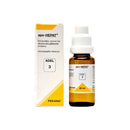Description
FOR JAUNDICE, GENERAL LIVER DISEASE, AND GALLBLADDER PROBLEMS
For jaundice; general liver diseases and gallbladder problems and portal congestions.
As the largest gland in the body, the liver serves as a processing factory of unmatched importance. It plays a key role in eliminating toxins and metabolic waste products from the blood ADEL 3 (apo-HEPAT) drops to treat and detoxify the liver, gallbladder, and pancreas, which work together to promote good digestion. This remedy provides a vital stimulus that aids in the excretion of liver toxins, thereby enabling the tissues to regenerate and resume normal function. It also eliminates liver portal blockages that commonly exist in chronically ill patients. In addition, ADEL 3 (apo-HEPAT) drops increase kidney and gallbladder secretion, stimulate circulation and improve the lymphatic system.
Chioanthus virginica 4X, Cynara scolymus 4X, Iberis amara 6X, Lycopodium clavatum 4X, Mandragora e rad sicc 6X, Peumus boldus 4X, Phosphorus 10X, Taraxacum officinale 12X.
MODE OF ACTION OF MAIN INGREDIENTS:
Chioanthus virginica resolves upper stomach ailments, vegetative dystonia (autonomic nervous system dysfunction) and dysfermentation of the liver and pancreas. In addition, this herb eliminates colic (painful spasms) and has a systemic effect that helps prevent migraines. It also addresses rheumatic processes and inflammation in the hepatic area.
Cynara scolymus primarily treats dyspepsia and hepatogenic gastritis. It is also effective for relieving the blockage of the portal vein into the liver and promotes excretion of toxins that accumulate in the organs and connective tissues from endogenous and exogenous sources. In addition, Cynara scolymus can help resolve acute and chronic infections, swelling of the liver, diabetes, hemorrhoids and digestive difficulties.
Iberis amaratreats the heart muscle and coronary vessels and improves peripheral circulation. It eliminates gastro-hepatic disruptions with symptoms that include intestinal pain and cramps
Lycopodium clavatum helps eliminate metabolic waste products and stimulates the excretion of excess cholesterol. Without proper excretion of waste products, patients can develop symptoms that include a strong desire to consume excessive amounts of sweets. This craving, often accompanied by mood swings, irritability, and depression, points to psychosomatic processes in which the body attempts to compensate by feeding the intestines sugar. Lycopodium clavatum eliminates both the physical and psychological basis for this craving.
Mandragora e rad sick addresses digestive upset, disruption of the proper stomach and liver function and pancreatic weakness accompanied by strong flatulence (in the case of spastic constipation).
Peumus boldus acts as a powerful stimulant for the gallbladder. This medication promotes stomach secretion and excretion of urea. It also secondarily helps treat dyspepsia and hepatogenic gastritis.
Phosphorus helps treat diseases of the stomach and intestinal tract, ranging from bleeding ulcers (Ulcera ventriculi, Ulcera duodeni) to acute liver dysfunction with accompanying spasms. Depression and other psychosomatic symptoms, as well as painful headaches, are also addressed. In addition, Phosphorus can effectively heal infections found throughout the body, including the eyes, respiratory tract, heart, and intestinal tract, as well as treat degenerative changes in the bone structures.
Taraxacum officinale cleans the liver and renal system. This bitter-tasting plant also addresses afflictions of the gallbladder and stimulates the gastrointestinal tract, pancreas, and liver to overcome impairment caused by illnesses such as rheumatism or arthritis.
Adults – 15–20 drops, Children – 7–10 drops, 3 times a day in 1/4 Cup of water.
Original Packing:20 ml sealed bottle


